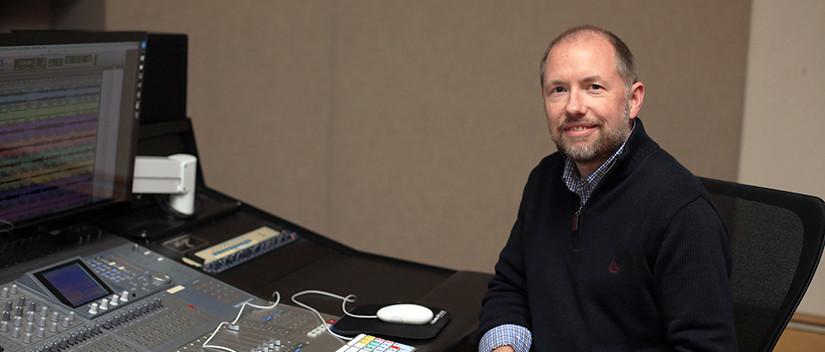After a career as a technical engineer with Sony Classical Productions and Sony Music Studios, Jeff Francis (2012 master’s, educational technology) joined the University of South Carolina School of Music as a recording engineer in 1999. His average spring semester includes teaching audio engineering, overseeing audio operations for the school and a heavy mix of freelance and consulting projects. Like many of us, his normal routine changed when the university closed in March, but he adapted and has served as a community resource for many beyond his department. His master’s degree in educational technology has helped him weather the transition successfully.
Francis’ coursework relies on audio equipment available in the School of Music’s recording studio. Without a physical lab, he quickly revamped his courses to fit students’ home environments.
“I immediately polled my students for a list of their home resources: — computers, audio hardware, speakers, and musical instruments,” Francis says. “Thankfully, many companies are providing free software for students to use at home.”
Once Francis was able to compile his students’ resources, he changed the course structure to include videos of lectures, software configurations and hardware setups.
“I tried to distribute information in bite-sized formats,” he says. “Many of my students are in different time zones or have variable internet access. I wanted to deliver the same learning experience, but I understand that siblings and parents are also working in the home.”
He credits his time in the College of Education for providing a “solid background in education and tools for designing coursework for online delivery and assessing student comprehension.” He has also been able to serve as a community resource for his colleagues, local churches and the South Carolina Philharmonic — where he has served as the recording engineer for 15 seasons.
“The Philharmonic contacted me about the possibility of creating a livestream for their concert on March 14,” Francis says. “I had previously set up similar School of Music streams for the Southeastern Piano Festival and Wind Ensemble concerts. I worked quickly to set up three cameras and prepped the Marketing Director to engage the audience via chat. Our work was featured in the Washington Post and the Philharmonic is planning to continue this in the future.”
Francis shared some strategies that might be helpful for other professionals who are making the virtual transition.
“Take a bit of time to set up your work area and system,” he says. “Lighting, microphone placement and testing are all important. Watch for background distractions and ask a tech-savvy colleague or housemate to give you feedback.” He encourages allowing students to connect independently on the chat, even during lectures.
“We’re all looking for new ways of connection and interaction,” Francis says. “Most importantly, have patience and give yourself and your students grace. This is unprecedented and we can’t know what challenges are facing people at home.”
The College of Education's programs in Educational Technology are taught 100 percent online and are designed to prepare leaders in the meaningful integration of educational technology in teaching, learning and performance environments. For more information on our master’s and doctoral programs in educational technology, visit sc.edu/education.
